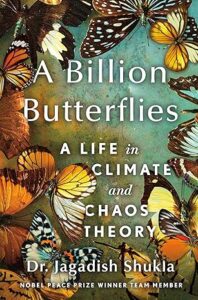(Reviewed by JD Jung)
Meteorologist and climate scientist Dr. Jagadish Shukla was a climate-change skeptic for years. What led him to change his mind? He recalls this and his life in his autobiography, A Billion Butterflies: A Life in Climate and Chaos Theory.
His interest in weather forecasting stemmed from a practical need. Growing up in a rural village in India, life depended on the weather. The monsoon rains had a great impact on everyone’s economic well-being. Wouldn’t it be great to be able to accurately forecast when the rains would hit, how long they would last and how wet they would be?
Studying in the United States provided such as culture shock to him. I found this story as fascinating as his journey as a climate scientist. However, this book is more than an autobiography. Shukla explains the history of weather forecasting, and his own discoveries. I found this too detailed for my taste, but still informative. He learned to make seasonal predictions based on ocean and land-boundary conditions. If they could predict an El Niño, then they could save lives and livelihoods just like predicting monsoons.
He shares to the reader how he eventually became a climate change believer. Through his research, he realized how devastating climate change could be. This is from many sources, such as massive deforestation, and carbon dioxide pumped into the air. He was demonized by many, which is a warning on how far reaching the influence of the fossil-fuel industry is.
True to its title, A Billion Butterflies introduces readers to Chaos Theory and the Butterfly Effect—concepts that underscore the interconnectedness of global weather patterns and small environmental changes. Though the depth of these concepts may appeal to a niche audience, the general message should appeal to all of us.



